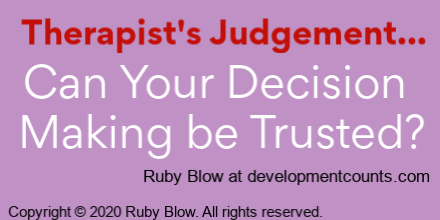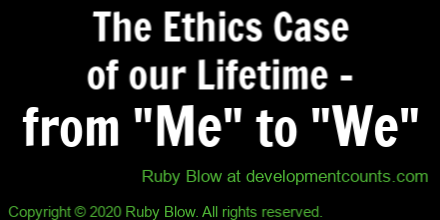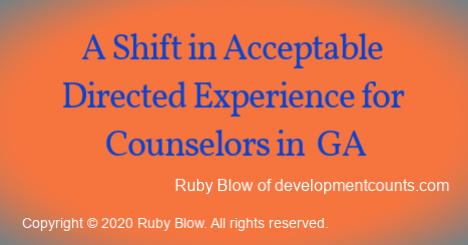A fundamental aspect of professional ethics in any profession rests upon the trustworthiness of the individuals providing the services. Being a professional means in part that you will put the needs and rights of the individuals being served ahead of your own. That does not mean that the service professional should be self-sacrificing. Instead it means that we should not take advantage and that we should always inform. Always err on the side of transparency. We must consider role conflicts in all of the various relationships: (1) Therapist/Client; (2) Supervisor/Supervisee (Therapist); (3) Director/Employee (Volunteer or Contractor); (4) Agency (Organization or Practice) and the public good.
Boundaries Define Us
Just like all other relationships, the cultivation of professional identity involves boundaries. What we will or will not do defines us. What we do or do not do reveals what we truly believe much more so than our words. It is our actions that tell the truth about who we are truly protecting in our professional endeavors.
The Known and the Unknown
I often consult on matters with colleagues having to do with supervision, licensure, and ethics respectively. At the heart of these dilemmas is information that is not known that perhaps should have been known or would ideally have been shared by others involved in the matter. In other words, humans have a tendency to keep to themselves that which they don’t feel good about or are uncertain about: the over-disclosure with clients; the failure to follow through on effective informed consent; the ineffective follow up on duties whether it is as Supervisor, Therapist, or Director. These circumstances can quickly devolve into silent retreats in separate corners, each party trying to justify why and how the other dropped the ball.
The ability to trust and remain trustworthy is compromised. As a Supervisor or Consultant, how can I know how to help and intercede if the supervisee or consultee doesn’t recognize that they are outside of the bounds of standards of practice? Or alternatively, the person recognizes they are outside of the bounds of standards of practice and intentionally fails to disclose it?
While supervision and consultation are not confessionals, these professional relationships are in place to support therapists when they are at their worst not their best. Certainly it is enjoyable to witness effective practice and give accolades, but it is not the path toward professional growth and ethical practice.
Responding to Disclosures
Supervisees should be sharing as many aspects of their professional experiences as possible, not as few as possible. Supervisors need to inquire, be curious, show engagement and ask questions…we must also listen. When we hear something of concern, the supervisee should be further alarmed by the supervisor’s anxiety. Instead, the prevailing tone should be one of recognition of what is true. Mistakes will be made and errors are part of the process. You don’t learn to become a competent and independent professional by already knowing everything you should do and how.
The Role of the Supervisor, Supervisee and Director
The cultivation of trust in the supervisory relationship is fundamental to professional identity and development. The supervisee is trusting that the supervisor has their best interest at heart. The supervisor is trusting the supervisee to give accurate disclosure and ask for help. The supervisee is trusting the supervisor to be responsive to them and responsible toward them. The director must free themselves as much as possible from role conflicts. The therapist is depending upon them both to help co-create the space for counseling and therapy to occur in an effective and ethical manner.
Clinical vs. Commercial Standards
Being trustworthy involves a continuous process of asking the question “What is my rationale for doing ‘x, y or z’?…Am I trying to avoid being ‘found out?’…Am I trying to make money and if so, am I doing so by a standard of clinical ethics as opposed to commercial standards?” Therapy, supervision, consultation, and education should be made known to be available; however “sales” is not the driving force. The ethos around sales is about zeroing in on a person’s “lack, wants or needs” and speaking to that lack, want or need. This type of marketing is designed to illicit a feeling so that people will take action to fulfill a need. Clinical standards for marketing encompass making it known that services are available and how to access them. The focus is on appropriate fit…not obtaining clients, supervisees, or attendees, regardless of whether the services are right for them professionally, personally or financially.
Self Disclosure
Just today, I disclosed to a potential consultee looking for a long term professional relationship to support their practice. I have determined that it is part of my professional obligation to disclose the limitations that I may encounter but cannot determine at any one time due to a health condition. In this moment of decision by a colleague, it is not my job to say the right words to sell. It is my role to present the information and support that person’s best decision for themselves. I seek to maintain a continuous level of trustworthiness. The kind that is active. It’s not perfect, just like I am not perfect. I’m not always timely and I need lots of prompts and reminders because life is hectic. What I am, though, is clear on my identity. I am clear on the boundaries of my actions professionally. It is because of this that I have the trust and respect of many peers and for that I am truly grateful.
P.S. I am doing well health-wise. I am accepting supervisees and providing individual consultation and coaching to independently licensed colleagues. However, depending on the type of services they are seeking, I provide some information about my potential limitations of practice. At this time almost all of my services are offered via video conference.
Copyright © 2019 Ruby Blow. All rights reserved.
Share your thoughts on Linkedin, Facebook, Twitter or log in to one of your accounts below to comment. Subscribe to my YouTube channel.





